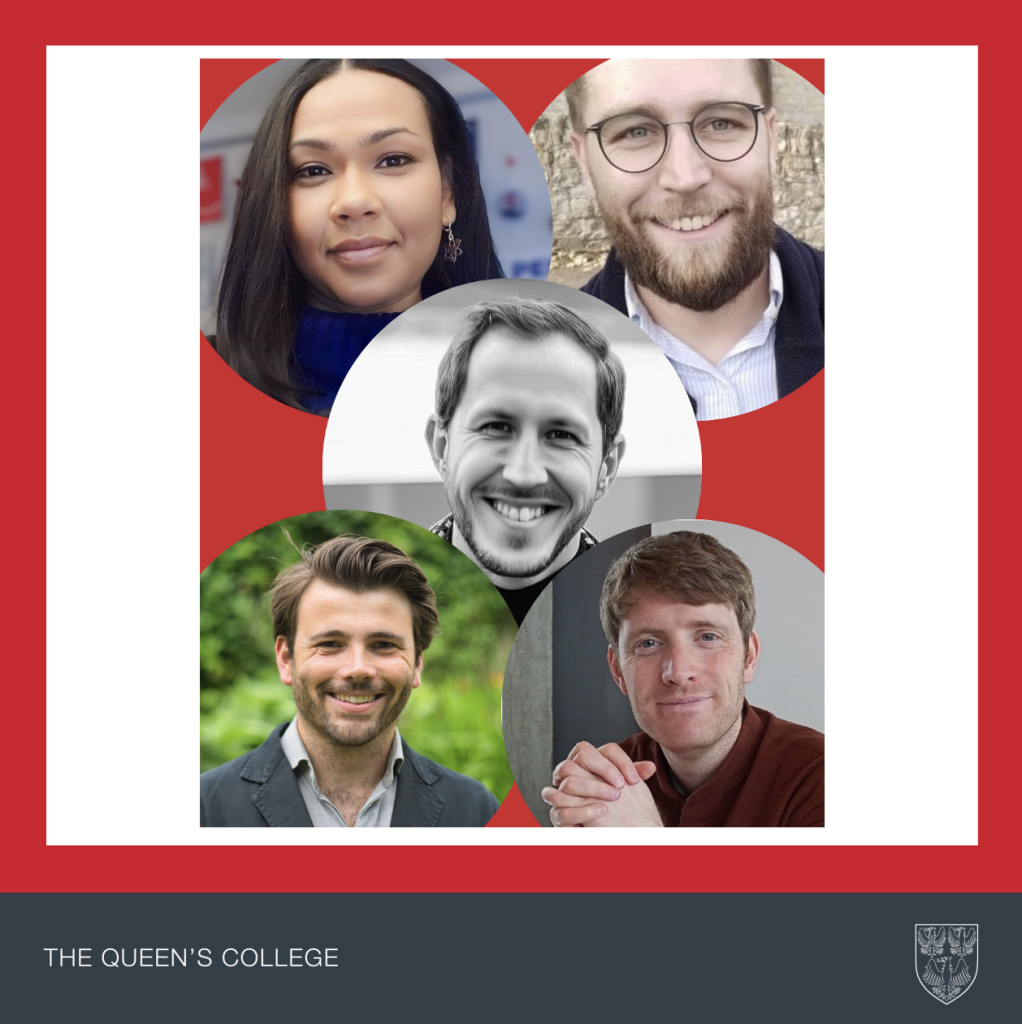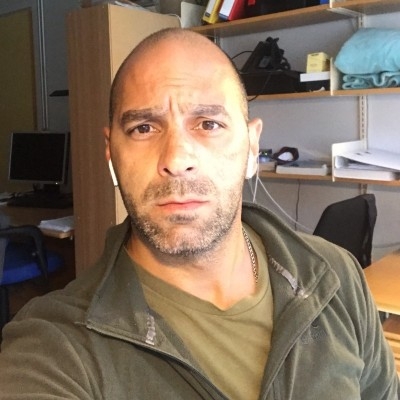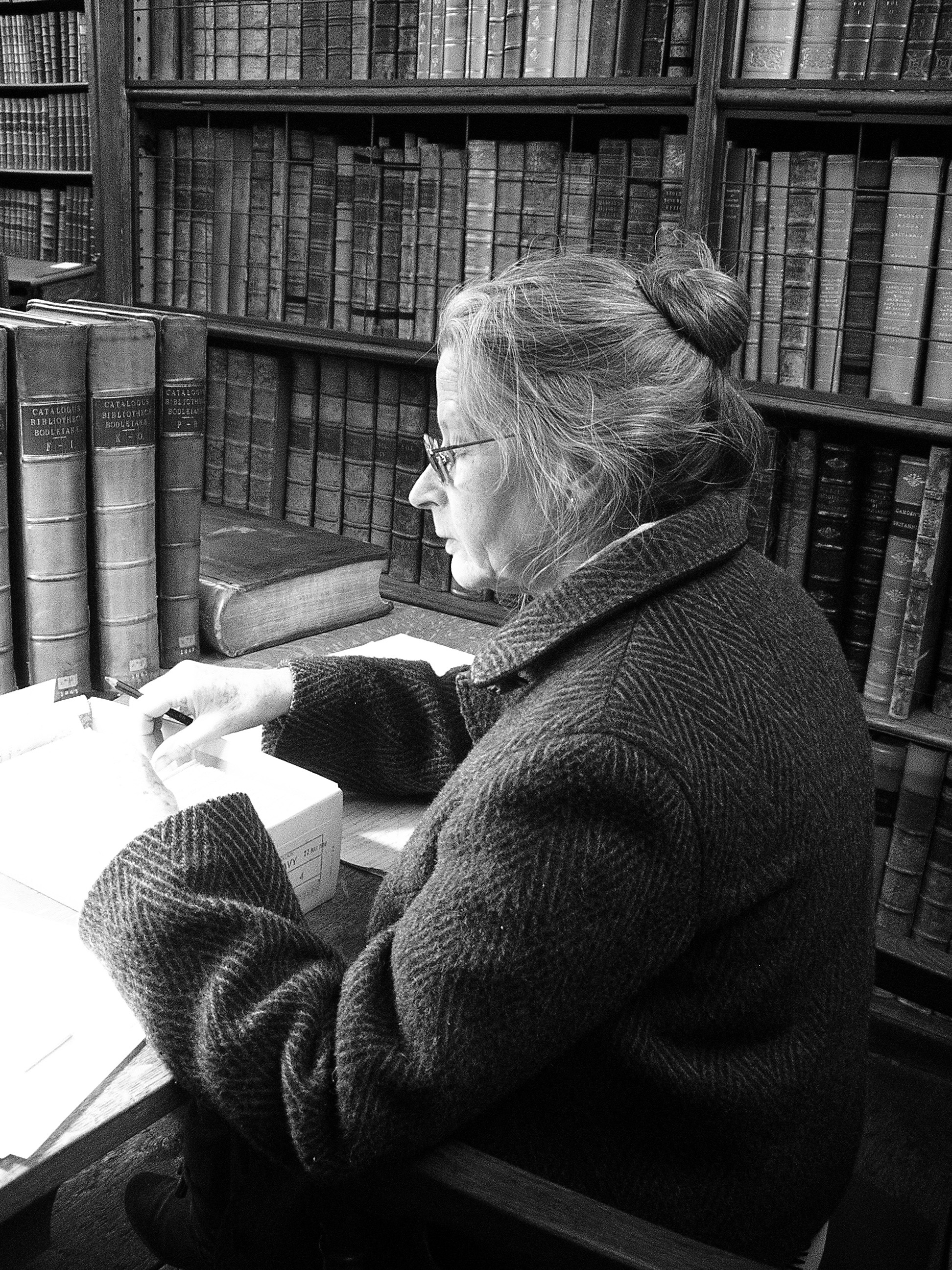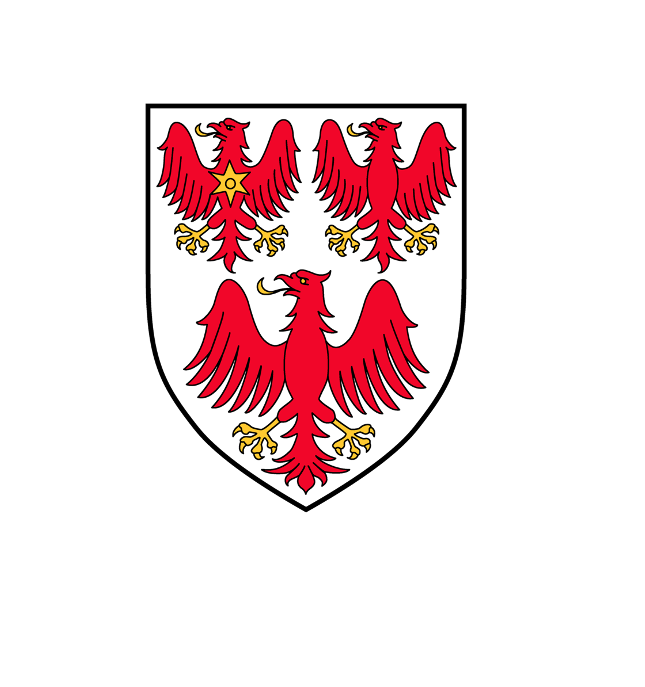At the start of each academic year, we welcome new academics to Queen’s. Please find brief biographies for our newest members below.
Dr David Ewing, Career Development Fellow in French
Pictured bottom left
David read History and French at St Hilda’s College, Oxford (2013–17), followed by an MSt in French at St Catherine’s College, Oxford (2019) and a PhD in French at Clare College, Cambridge (2019–23). He first joined Queen’s as a Stipendiary Lecturer in French in 2024.
He teaches French literature of the nineteenth, twentieth, and twenty-first centuries to first- and second- year students of French, as well as literary translation and critical theory. David’s research investigates how novels published at the centre of the collapsing French empire (c. 1944–1979) deal with the promises and devastations of an advancing modernity. His PhD argued that experiments with the French novel between 1957 and 1966 configured everyday life as a ground of human existence and a resource for ethical enquiry. Through close readings of four novels – Michel Butor’s La Modification (1957), Georges Perec’s Les Choses (1965), Nathalie Sarraute’s Le Planétarium (1959), and Marguerite Duras’s Le Vice-Consul (1966) – he argued for the significance of narrative fiction in the development of a conceptual history of everyday life, and particularly for its capacity to reflect on the conditions of possibility for thinking ethics through everydayness. His postdoctoral project explores the notion that the postwar period in metropolitan France was marked by an historically unprecedented set of conditions for living well. Through the close reading of literary fiction, he is seeking to recover structures of feeling whose relation to major historico-philosophical concepts – optimism, solidarity, coloniality (e.g.) – challenge the historiographical commonplace according to which France experienced ‘thirty glorious years’ after the war.
Dr Nakita Noel, Fellow in Physics
Pictured top left
After completing undergraduate degrees in Chemistry and Physics, Nakita did her DPhil in Condensed Matter Physics at Oxford where her research focused on developing new semiconductor materials for use in photovoltaics. She then stayed on as a postdoctoral research associate before moving to Princeton University in 2017 to take up a postdoctoral fellowship jointly held between the Princeton Center for Complex Materials and the Princeton Materials Institute. In 2021, Nakita returned to Oxford as an EPSRC Early Career Research Fellow in Condensed Matter Phyiscs and was appointed a Research Fellow in Physics at Corpus Christi College.
At Queen’s, Nakita will teach a range of topics to undergraduates, including optics, circuit theory, electromagnetism, thermal and statistical physics, and condensed matter physics. Her research lies at the interface of physics, chemistry, and materials science, with a focus on the development and advanced characterisation of semiconductor materials for optoelectronic applications such as photovoltaics, light-emitting diodes, and lasers. Her work seeks to establish a fundamental understanding of how precursor materials assemble into high-quality compound semiconductors. In particular, she develops novel kinetic pathways to modulate crystallisation dynamics in systems such as halide perovskites and pnictides, with the aim of optimising their optoelectronic properties and improving both material and device stability.
Dr Jeremy Page, Career Development Fellow in Philosophy
Pictured bottom right
Dr Page arrives at Queen’s from Uppsala University in Sweden, where they completed their doctorate in the Department of Philosophy and subsequently worked as a postdoc in the Department of Literature and Rhetoric. Their thesis was entitled ‘Essays on Aesthetic Cognitivism’, and two papers drawn from it won essay prizes: ‘Aesthetic Understanding’ (European Society for Aesthetics Essay Prize, 2020) and ‘Artistic Honesty’ (British Society for Aesthetics Essay Prize, 2024).
At Queen’s, they will teach the first-year papers in Logic, General Philosophy, and Moral Philosophy, as well as the final-year Ethics paper. Their primary research project at Queen’s focuses on philosophical aesthetics and draws on work in the history of philosophy, value theory, epistemology, and normative theory. It revolves around two currently neglected claims with a venerable historical lineage. First, that objects bearing aesthetic value require us to explore them cognitively—on their own terms and for their own sake—as the distinct individuals they are. Second, that intelligible beauty is the highest form of aesthetic value. They intend to develop a comprehensive account of aesthetic value and aesthetic normativity based on these two claims.
Dr Clément Salah, Junior Research Fellowship in Manuscript and Text Cultures
Pictured top right
Clément completed a PhD in History and Religious Studies at Sorbonne University (France) and the University of Lausanne (Switzerland), with a focus on Islamic history. His research interests include Islamic legal history, Arabic codicology and palaeography, and the social history of knowledge. He has taught and conducted research at the University of Lausanne (Switzerland), Sorbonne Nouvelle (France), and the Consejo Superior de Investigaciones Científicas (Spain).
At Queen’s, Clément will pursue his project The Manuscripts of Kairouan: Material Culture of Early Muslim Scholars, which investigates the materiality of Arabic manuscripts produced in the city of Kairouan (in present-day Tunisia) between the 9th and 11th centuries. By treating these manuscripts as historical artefacts, the project explores the social, intellectual, and scribal practices of early Muslim scholars, and seeks to reassess the book culture of premodern North Africa and its place within broader Mediterranean manuscript traditions. He looks forward to contributing to the Centre for Manuscript and Text Cultures and to becoming part of the Queen’s community.
Dr Mats van Es, Junior Research Fellow in Experimental Psychology
Pictured in the middle
Mats is a postdoctoral neuroscientist at the Oxford Centre for Human Brain Activity in the Department of Psychiatry. He combines advanced brain imaging with innovative computational tools to explore some of the most fundamental questions in neuroscience. His recent work uncovered recurring patterns of brain activity, known as “brain network cycles,” which may act as internal clocks for human cognition. In addition, Mats is a leading developer of open-source software for brain imaging, making his methods and tools freely available to researchers worldwide.
At Queen’s, Mats will investigate how the precise timing of brain network activity enables memory, attention, and decision-making. By uncovering the mechanisms that govern these networks, he aims to shed light on how the brain flexibly coordinates complex behaviour. In the longer term, these discoveries could provide sensitive biomarkers of brain health and inform new approaches for optimally timing brain stimulation therapies, offering potential applications for conditions such as Alzheimer’s disease and depression.



